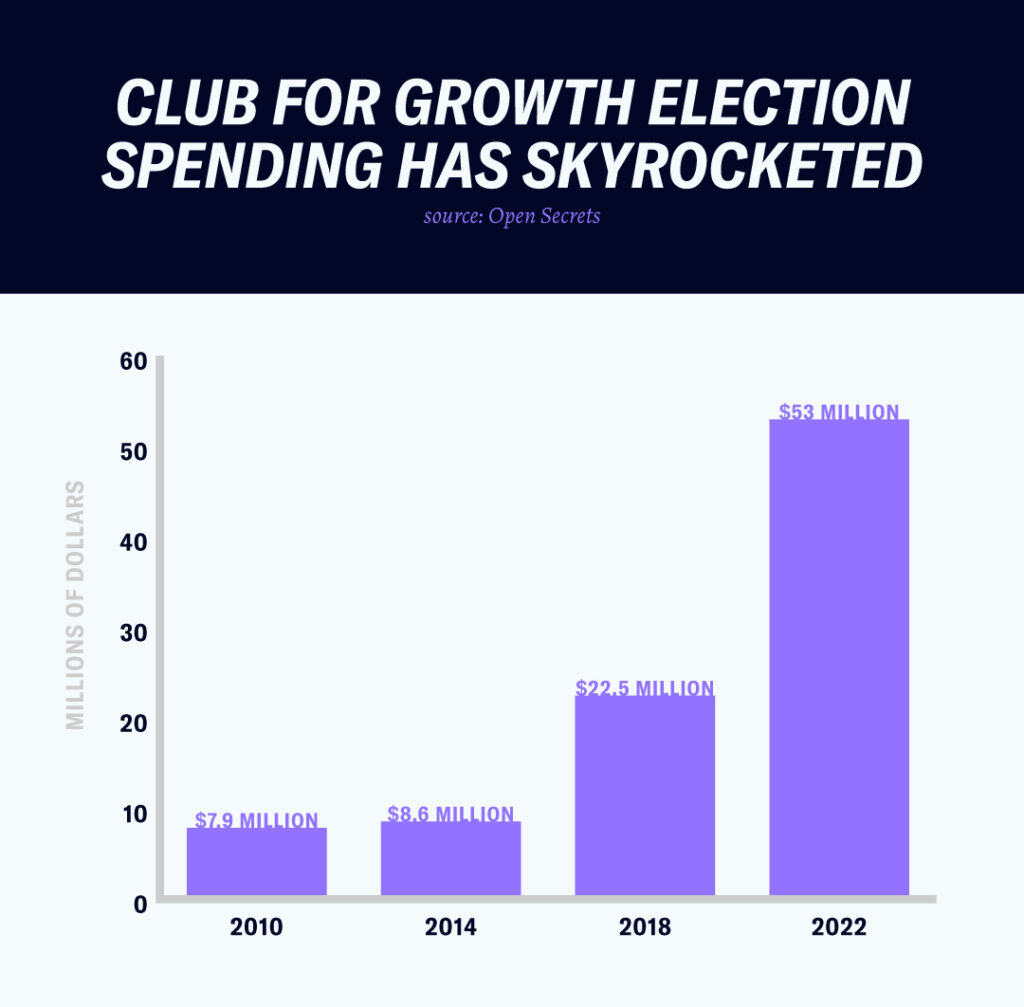By David Moore and Donald Shaw, Sludge
A conservative anti-tax, anti-Social Security nonprofit that was founded in the late ‘90s has dramatically scaled up its elections work and is the top spender on federal elections so far this cycle.
The Club for Growth has spent more than $53 million on federal races this cycle through its super PACs and PAC, according to OpenSecrets. That’s far more money than even the major party-linked super PACs like the Congressional Leadership Fund and Senate Majority PAC have spent. It has already spent far more than it has in all other previous midterm cycles since outside spending rules were loosened by the 2010 Supreme Court case Citizens United. In the 2018 cycle, the Club for Growth spent $22.5 million, in the 2014 cycle it spent $8.6 million, and in the 2010 cycle it spent $7.9 million.

As outside spending groups like Club for Growth flood U.S. televisions with ads, the public has been registering more and more support in polls for new campaign finance reform laws that would boost transparency. The Senate will vote this week on a bill called the DISCLOSE ACT that would make it easier for people to learn about the donors behind Club for Growth’s massive spending. Under one provision in the bill, political ads from groups that spend money on elections would be required to name their sponsors’ top five donors over the past year in the “paid for by” sections of ads.
The DISCLOSE Act was originally introduced by Democrats in 2010, but twice filibustered by Senate Republicans and prevented from advancing to a vote. Democratic efforts to pass the bill have since been similarly stymied. In a speech at the White House this week, President Biden endorsed the DISCLOSE ACT and warned that “there’s too much money that flows in the shadows to influence our elections.” The bill is expected to be filibustered by Republicans, with Sen. Mitch McConnell staunchly opposed to new disclosure requirements. (Ironically, in 1997, McConnell advocated for disclosure rules, arguing they would be “the best disinfectant.”)
The Club for Growth, founded in 1999 by conservative activists like former Trump adviser Stephen Moore, advocates for pro-corporate policies such as eliminating the individual capital gains tax and corporate income taxes, ending the federal government’s role in education, cutting Social Security and Medicare, and repealing Obamacare. The Club has long advocated for Republican candidates to proudly embrace cutting Social Security, and was a key proponent for President George W. Bush’s privatization scheme in 2005. The Club was led by Republican Sen. Pat Toomey from 2005 to 2009. Recently, former congressmen representing Indiana’s 2nd Congressional District have been at the helm—first, Chris Chocola, and now, David McIntosh. It maintains a prominent scorecard of Republican members of Congress, rating them on a scale of 0-100 based on how they voted over the past year. Among those with perfect lifetime scores from the Club for Growth are House Freedom Caucus members Lauren Boebert and Andy Biggs.
When Senator Rick Scott (R-Fla.) came out with his “Rescue America” plan that called for ending Social Security and Medicare funding, the Club for Growth hailed it as a “smart, principled agenda” that all Republican candidates should run on. Ron Johnson (R-Wis.), one of the Club’s favorite senators, subsequently called for ending the guaranteed funding for Social Security and Medicare.
Ohio Ad Blitz in Senate Republican Primary
The bulk of the Club’s money has been spent in Republican primaries on ads opposing candidates for being “never Trumpers” or for having lapsed from Republican Party orthodoxy in their pasts. For example, Club for Growth’s super PAC spent more than $5 million on attacking Ohio Senate Republican candidate J.D. Vance in his primary, repeatedly hammering on Vance’s statements in 2016 that he “is a ‘never-Trump’ guy” and that he “might have to hold [his] nose and vote for Hillary Clinton.” The Club preferred another Republican candidate who would take a harder line on cutting government spending and delivering more tax cuts for the wealthy. Despite the spending, Vance prevailed in the crowded primary race and is now the Republican nominee.
The Club for Growth opposed Trump in 2016 because it deemed him too “liberal” on tax and entitlement policies, but it warmed up to him once he was in office. The alliance continued into this year, when Trump said onstage at an April rally in North Carolina, “David McIntosh is a very powerful man, he’s the head of the Club for Growth and a very good friend of mine, and we are undefeated when we work together.” McIntosh took the microphone to gush back, saying, “Mr. President, you are a great man who is once again going to lead this country back to freedom,” and listing the many Republican candidates they would elect in partnership. However, Club for Growth’s recent spending in Ohio against J.D. Vance has spoiled that relationship.
Even though Vance spoke out strongly against Trump in 2016, the candidate worked to recreate his image as a socially conservative Trump-style candidate and was able to win the endorsement of the former president in April. When Club for Growth continued its anti-Vance spending after the Trump endorsement, Trump’s assistant passed along a message to the group’s president David McIntosh, via text: “Go f*^% yourself,” the message said, according to New York Times political reporter Maggie Haberman. Donald Trump Jr. piled on without naming Club for Growth, tweeting “The RINO frauds attacking @JDVance1 HATE him precisely because they know he will shake up the establishment and put America First in the Senate!” Vance has been strongly backed and funded by billionaire Trump supporter Peter Thiel, who helped the candidate win Trump’s endorsement by escorting him on trips to visit the former president at Mar-a-Lago, according to Politico.
Backing of North Carolina Senate Republican Candidate Ted Budd
No candidate has benefited more this cycle from the group’s super PAC, Club for Growth Action, than North Carolina Senate nominee Ted Budd, a congressman who rode more than $12.2 million in backing from the group—and a surprise Trump endorsement last year—to comfortably win the May primary against better-known Republicans in the state. Budd’s campaign was criticized by his Republican rival former Gov. Pat McCrory for relying on massive outside spending while sitting out debates, with McCrory accusing Club for Growth of trying to buy the primary in contradiction to its cause of supporting limited government.
After Budd’s primary win, North Carolina Democrats put out statements criticizing the lavish trips to conferences at a Florida luxury resort that Budd’s campaign benefactor Club for Growth sponsored for the congressman from 2017 to 2020.
While the Club for Growth has publicly hailed Rick Scott’s plan to phase down Social Security and Medicare funding, Budd has tried to circumvent conversation about it. “I like Rick Scott,” he said, “but you gotta be careful how you talk about his plan right now.”
Attacking Nevada Democrat Sen. Catherine Cortez Masto
Nearly all of Club for Growth Action’s spending so far this cycle has focused on Republican candidates, but one Democratic senator up for re-election, Catherine Cortez Masto of Nevada, has already seen more than $1.9 million in spending against her from the PAC. The ads claim that “Catherine Masto voted to unleash 87,000 new IRS agents on middle class Americans,” a reference to IRS funding in the Democratic budget reconciliation bill. The nonpartisan fact-checking website factcheck.org says that most of these agents who will be hired with the funds will be used for customer service and for enforcement against high-income and corporate tax evaders.
Other Club for Growth Groups Spending on Elections
In addition to its super PAC efforts, Club for Growth’s PAC has spent more than $2.1 million this cycle, including independent expenditures backing campaigns like those of Budd, Utah’s Mike Lee, Kentucky’s Rand Paul, and Missouri state Sen. Eric Burlison in his bid for the U.S. House. On top of PAC support, Club for Growth employees and their families have contributed more than $240,000 to Budd’s Senate campaign so far, according to OpenSecrets.
This cycle, Club for Growth has branched out with the School Freedom Fund, an affiliated super PAC founded late last year to support the privatization of public education. The super PAC was seeded with $15 million in donations from billionaire trader and libertarian Jeff Yass, making up virtually all of its funding, and it has already spent $10.5 million in over a dozen races for federal office. Last year, Club for Growth launched a National Campaign for School Freedom, holding events with potential Republican presidential hopefuls like former Secretary of State Mike Pompeo and Sen. Ted Cruz in the early primary states of New Hampshire and Nevada.
In June, Club for Growth joined the trend of new super PACs on cryptocurrency issues by forming the Crypto Freedom PAC, listing McIntosh as its designated agent. It quickly spent more than $2.4 million ahead of the Aug. 2 Republican primary for Senate in Arizona benefiting now-nominee Blake Masters, a Bitcoin evangelist who has millions of dollars invested in cryptocurrencies. Of that amount, nearly $2 million was spent attacking businessman Jim Lamon in ads highlighting his corporate ties to China, with no mention of cryptocurrency. Another video spot touts Masters, also a close ally of the Bitcoin-invested libertarian Peter Thiel, as “strong like Trump, endorsed by Trump.” The Crypto Freedom PAC received $2.2 million from Club for Growth Action, augmented by a $1.9 million donation in the form of Bitcoin from Jeff Yass and $1.4 million from Bitcoin financial services firm River Financial, according to FEC records. A super PAC official told The Daily Beast that the PAC is a “bit of a response to GOP establishment crypto PACs” that have sprouted up to influence elections, calling crypto an “emerging issue” on which it aims to lead. Last month, Club for Growth put out a statement opposing an International Monetary Fund paper that recommends a global, coordinated response to regulating the cryptocurrency industry, saying it was “extremely misguided and could present national security issues.”
The Club for Growth Action super PAC has also funneled contributions to PACs buying ads in midterm contests. The Conservative Outsider PAC, a super PAC formed in 2020, has received more than $6.1 million from Club for Growth Action, according to FEC data, making up the vast majority of its donations. The tight-lipped group has spent in handfuls of primaries, including more than $2.5 million against Rep. Rodney Davis, who lost in Illinois to Club for Growth-endorsed Rep. Mary Miller. A super PAC named USA Freedom Fund received $2.9 million from Club for Growth Action. The group ran ads attacking the rivals of Josh Mandel and supporting the Club for Growth-endorsed Mandel in the Ohio primary. Protect Freedom PAC, a Rand Paul-linked super PAC, has received $485,000 from Club for Growth Action this cycle. It spent more than $419,000 backing Sarah Palin in the special election for Alaska’s U.S. House seat, among other congressional races.
Crypto Campaign in New York
In May, Club for Growth ran a Facebook ad campaign venturing into a new field: opposing a bill passed by the New York legislature that would temporarily halt approval of new cryptocurrency mining projects at fossil fuel-burning power plants. One ad directing New Yorkers to call their state senators read, “Did you know that crypto mining is the MOST sustainable industry globally and has helped create jobs, economic growth, and investment in New York? Yet, some NY State Senators are unaware of the important role the industry plays in the state and want to ban crypto mining.” After a last-minute vote on June 3 at the close of the state legislative session, the bill advanced to Gov. Kathy Hochul, who is expected to make a decision whether to sign or veto it by the end of the year. The cryptocurrency industry had pushed back in a lobbying campaign opposing the two-year moratorium on new crypto mining ventures for currencies like Bitcoin, with industry officials eyeing the possibility that the model legislation and its proposed environmental impact review could spread to other states.
Billionaire Super PAC Donors
The top donors to Club for Growth Action this cycle make up a roster of Republican megadonors and billionaire financiers, several of whom banked enormous savings from tax cuts passed under President Trump. The Republican politicians who Club for Growth Action supports would likely keep in place the Trump tax cuts for the rich, while a filibuster-proof Democratic Congress and president would support increasing taxes on the wealthy.
Richard Uihlein, the billionaire shipping supplies magnate, is far and away the number one donor to Club for Growth Action with $26.6 million given so far this cycle. A purported advocate of “individual liberty,” Richard Uihlein has been a big funder against a woman’s right to choose. Earlier this year his PAC donated $2.5 million to anti-abortion PACs affiliated with Susan B. Anthony Pro Life America, a Christian advocacy group that supports a total ban on abortion with no exceptions. With his wife Elizabeth, the Uihleins leapt up the ranks starting in the 2018 cycle to become one of the top conservative donor families, seeking to pressure the GOP on an agenda of cutting regulations, lowering taxes, and quashing unions. The Uihleins have also donated millions to Tea Party Patriots, one of the groups that sponsored the January 6 “Stop the Steal” rally. A report last year from ProPublica projected that the Uihleins could save more than half a billion dollars in taxes over eight years from a provision pushed through by Republican Sen. Ron Johnson. Liz Uihlein publishes a newsletter for her employees where she has written about her fears being around homeless people, complained about government energy efficiency mandates, and how she and her husband get their cable TV news from Fox News.
Jeff Yass has given Club for Growth Action $5.5 million so far this cycle, in addition to the $15 million donated to the school privatization super PAC. The Pennsylvania-based billionaire has been steadily increasing his donations to Club for Growth Action in recent years, from $750,000 in the 2016 cycle to more than $21 million in the 2020 cycle. One of Yass’ personal policy priorities is expanding access to charter schools, a position that Club for Growth expresses on its website. Yass is opposed to what he calls “self-serving teachers unions.” An analysis of IRS data by ProPublica found that Yass’ tax strategies have saved him at least $1 billion over the last six years, allowing him to pay an average federal income tax rate of just 19%, well below that of other high-flying traders. For the past five years, Yass’ giant trading firm Susquehanna has engaged in cryptocurrency trading, including in Bitcoin futures, and this summer the company announced plans to open a trading office in the industry-friendly Bahamas.
Other top Club for Growth Action donors include investor Virginia James ($5.9 million), businesswoman and GOP megadonor Diane Hendricks ($3.5 million), private equity billionaire John W. Childs (more than $1 million), and food packaging company CEO David Frecka ($1 million). Rick Gaby, the husband of Barb Van Andel-Gaby, chair of the conservative think tank Heritage Foundation and whose family co-founded the multilevel marketing company Amway, has donated $1.5 million to Club for Growth Action.
Donors to Club for Growth
At the heart of the Club for Growth network is a 501(c)(4) nonprofit organization that had annual revenues in 2020 of $18.7 million—nearly double its annual revenue for 2018, according to tax returns. As a nonprofit, Club for Growth is not required to disclose its donors; however, some of its donors can be identified through reviewing other nonprofit organizations’ tax forms, where they are required to list their grantees.
An organization currently calling itself The Concord Fund donated $1.1 million to Club for Growth in 2021. The Concord Fund, formerly known as the Judicial Crisis Network, is a “dark money” organization that has spent tens of millions of dollars over the years on ads supporting Republican presidents’ Supreme Court nominees and opposing Barack Obama’s nominees. It is closely tied to Federalist Society co-chairman Leonard Leo, the conservative judicial activist whose Marble Freedom Trust in 2021 received a donation of $1.6 billion from electrical device manufacturing company founder Barre Seid.
Club for Growth’s McIntosh invoked his conservative movement bona fides in a speech last year to the Conservative Political Action Conference (CPAC), saying, “I co-founded the Federalist Society when I was studying under Antonin Scalia, I worked for Ronald Reagan in my twenties, and I was one of the freshmen in 1994 that won the majority for Republicans in Congress, so I know how to win.”
The American Exceptionalism Institute (AEI) donated $3 million to Club for Growth in 2020. AEI is a dark money Republican 501(c)(4) group that contributed to a pro-Kelly Loeffler super PAC in 2020. Its only known donor is Nevada Gold Mines, which gave it $750,000 in 2020. The donation was voluntarily disclosed by Newmont, one of the companies that makes up the Nevada Gold Mines joint venture.
Another Club for Growth donor is a nonprofit calling itself QXZ Inc. QXZ donated more than $6.6 million to Club for Growth from 2016 through 2019. More recent disclosures are not available, so the total could be higher. QXZ is a 501(c)(4) that says on its tax filings its mission is simply to fund like-minded 501(c)(4) organizations. Its chairman is Republican strategist and lobbyist Josh Novotney, whose lobbying clients include cash advance industry group Commercial Finance Coalition. Novotney formerly worked on the campaign and Senate staff of Sen. Pat Toomey, a former president of the Club for Growth. In 2018 and 2019, Novotney’s clients included health insurance company Independence Blue Cross and online cash advance company Arrowhead Advance.
Freedom Partners Chamber of Commerce donated $175,000 to Club for Growth in 2017. Freedom Partners Chamber of Commerce was a Koch network organization that Politico once described as “the Koch brothers’ secret bank.”



